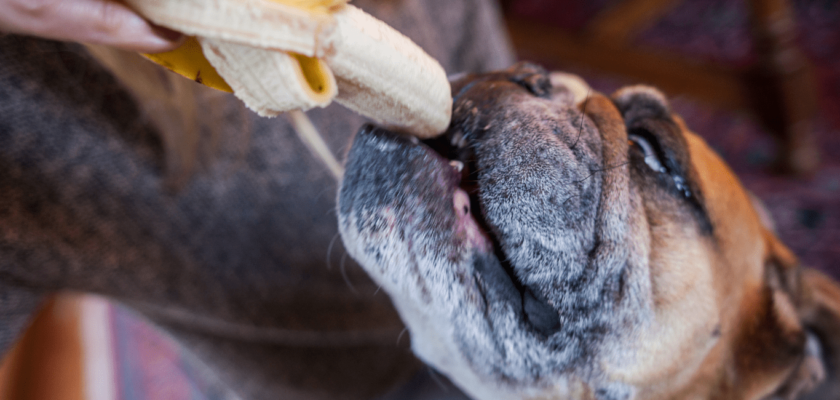Every dog owner has had moments like this: you open the fridge, a bag of chips, a can of food (any kind!), or a cupboard full of your favorite snacks. Your canine friend, who until then had been sleeping peacefully and daydreaming, suddenly wakes up and stands two feet away with a pleading look on his face and a slow trickle of drool running down the floor…
What do you do? Give in and let them have some? Or do you stand your ground and fight back against those big sad eyes?
Before you do, you should check to see if the food is safe, as some human foods can be seriously harmful to dogs.
But our mission is to find out if dogs can eat bananas?
And it’s a good thing you’re here, as it shows you’re a responsible and caring pet owner. So, let’s go ahead and explore everything there is to know about dogs and bananas!
Can dogs eat bananas?
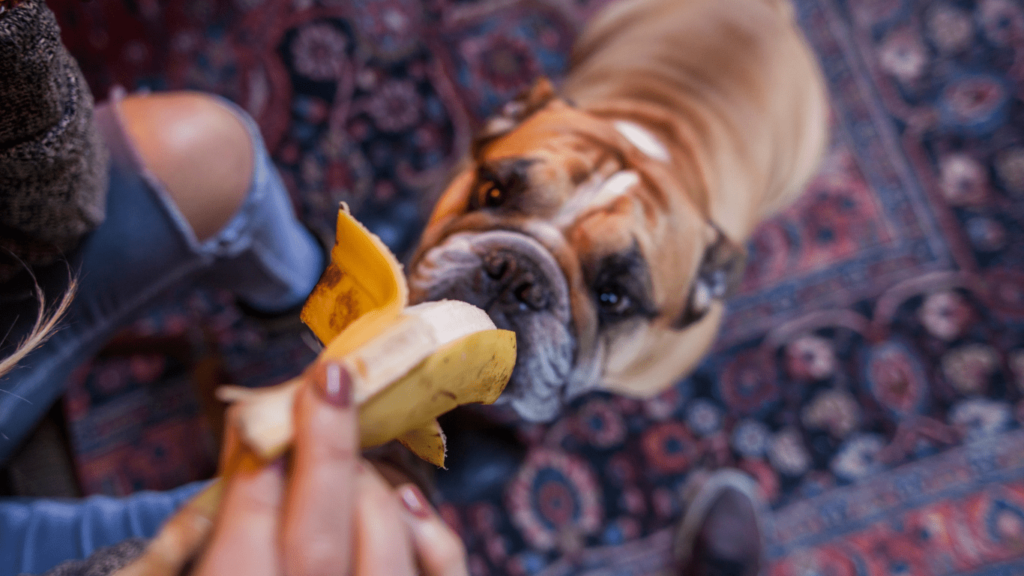
The quick answer is yes.
However, there are some important rules you need to follow, and we’ll explain them as we go along.
Your dog’s diet is your responsibility, as they can’t choose what they eat.
That’s why you should check to see if bananas are safe for your pet!
These days, this is pretty easy; all you have to do is go online and type, can my dog eat XYZ? This can save you and your dog a lot of stress, discomfort, injury, and expense.
Admittedly, you’ll find conflicting information and advice. The best approach is to go with the flow and trust your instincts.
In that regard, it’s important to keep banana peels out of your dog’s reach. Banana peels are tough and fibrous; if your dog eats one, it can cause an upset stomach or even intestinal obstruction.
Aside from the puppy begging for food situation we mentioned at the beginning, it’s possible that your dog has eaten some bananas and you’re worried about any possible side effects.
At this point, most dog owners are frantically Googling “are bananas bad for dogs” and calling their vet.
The good news is that in most cases, plantains are not harmful to dogs.
So before you panic and run to the vet at 200 mph, your furry friend is probably fine. Aside from a possible stomach upset, there’s no lasting harm done.
Now, let’s learn more about this banana-like fruit that’s more like a vegetable!
Avoid confusion: What are plantains?
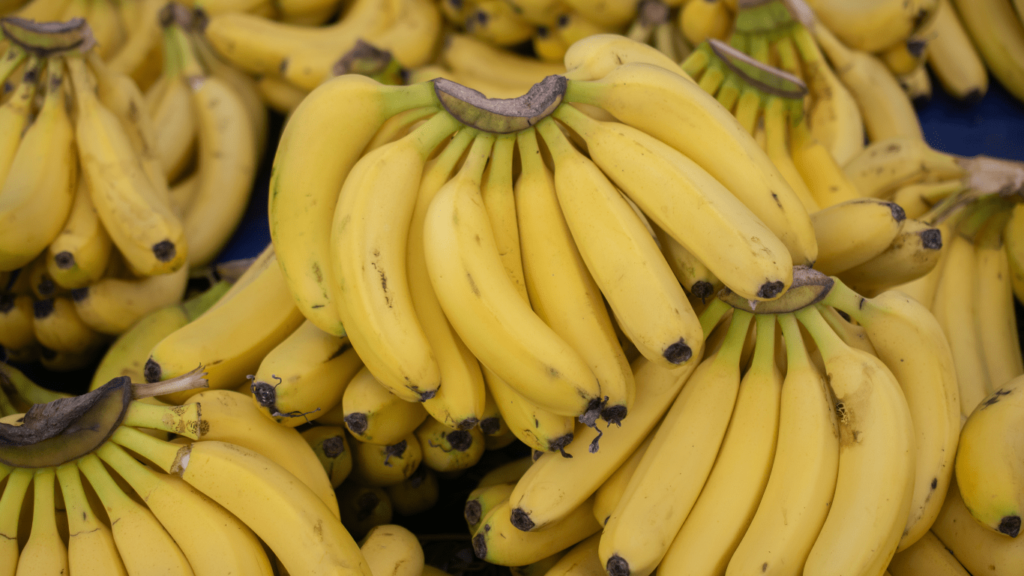
We’re talking about the cooking banana, which originated in Southeast Asia and is now a staple in Caribbean and Central American cuisine.
Although unlikely, this plant should not be confused with plantain or plantain.
The former is considered a medicinal and culinary herb and is widely found in Europe and Asia, where it has several other names, including waybread. It does not look much like a cooking plantain, so there is little chance of confusing them.
However, there is little danger if you do: these plants are packed with nutrients.
Plantains, also known as Hostas, are prized by gardeners for their ease of growing.
Again, they are not similar to plantains, but it is best to be cautious as these plants are poisonous to dogs. Plantain flowers contain a toxin called saponin that is a skin irritant and will cause severe stomach upset if eaten by dogs.
Can dogs eat bananas? Yes, but check that it is the right type of banana!
Can dogs eat cooked bananas?
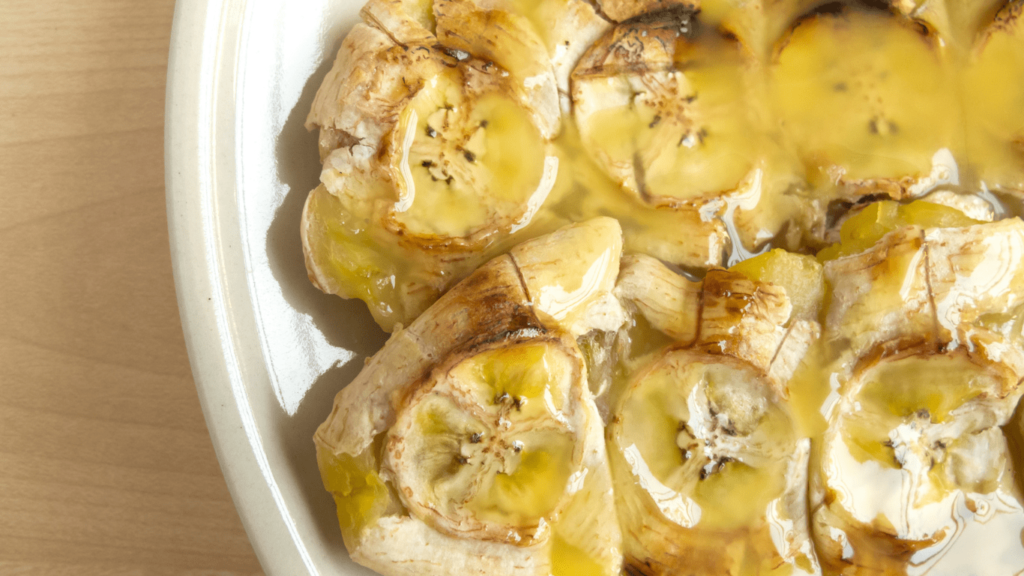
As you can see from their appearance, plantains are related to bananas. However, they don’t have the same taste as their smaller cousins and they are high in starch. In terms of texture, they resemble a raw potato.
A dog’s digestive system can’t handle too much starchy food, which can cause them to have an upset stomach.
If your furry friend chews through a raw banana or two, it may cause some unpleasant digestive issues in the short term, but it won’t cause any long-term harm.
Therefore, cooked bananas are the best way to protect our furry friends from getting sick.
However, the cooking method is also important!
The best way to cook bananas and retain all the nutrients inside is to steam or boil them. Some nutritionists consider boiled bananas to be a ‘superfood’.
Like potatoes, we add flavour and spices to plantains because they are quite bland. However, it is best to skip this when feeding your dog. All spicy foods are toxic to dogs.
Don’t worry about the taste: dogs don’t taste food the same way we do because they have fewer taste buds. And in any case, most food barely touches the sides when it goes down!
Can dogs eat bananas? Yes, but they must be cooked and not eaten raw!
Can dogs eat fried bananas?
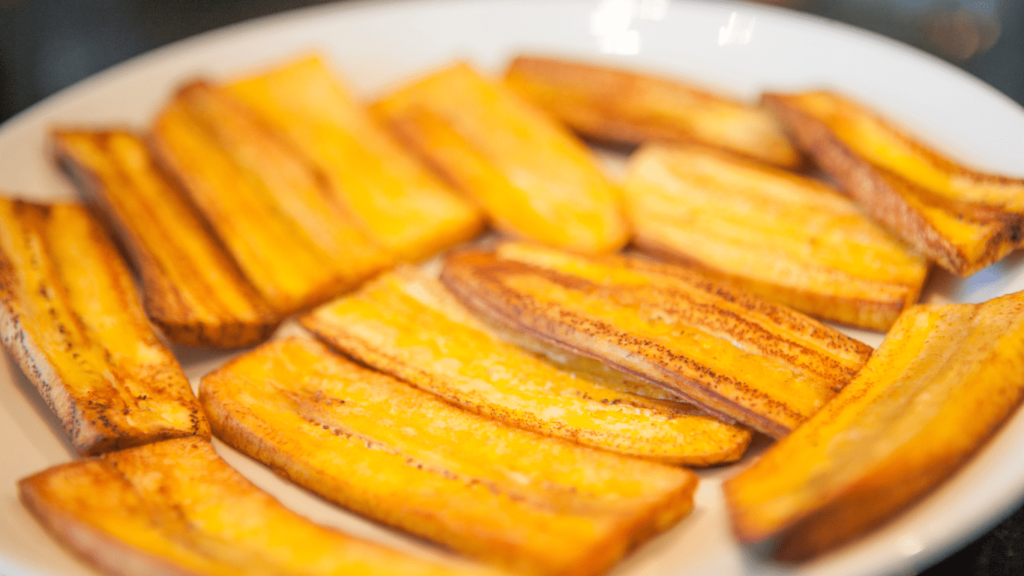
It is not a good idea to feed your dog any fried food, so Stay away from them.
Fried bananas are a popular snack in many parts of the world, although frying them takes away some of their health benefits. Bananas can be fried when they are green and unripe, or when they are yellow or even completely black.
However, as much as we love them, they are not the best choice for our furry friends.
In addition to being of lower nutritional value, fried foods are also bad for dogs because they can cause pancreatitis. This condition causes the pancreas to become inflamed and produce toxic enzymes that damage the dog’s intestines. Although most dogs recover, pancreatitis can be fatal if not caught early.
Frys also contribute to obesity, heart disease and diabetes.
While you can feed your dog fried foods in small amounts without any obvious side effects, they tend to add up over time. You can’t see the damage, but it happens over time and suddenly your furry friend will be sick. In many cases, by then, it’s too late.
Can dogs eat bananas? Yes, but not fried!
Can dogs eat green bananas?
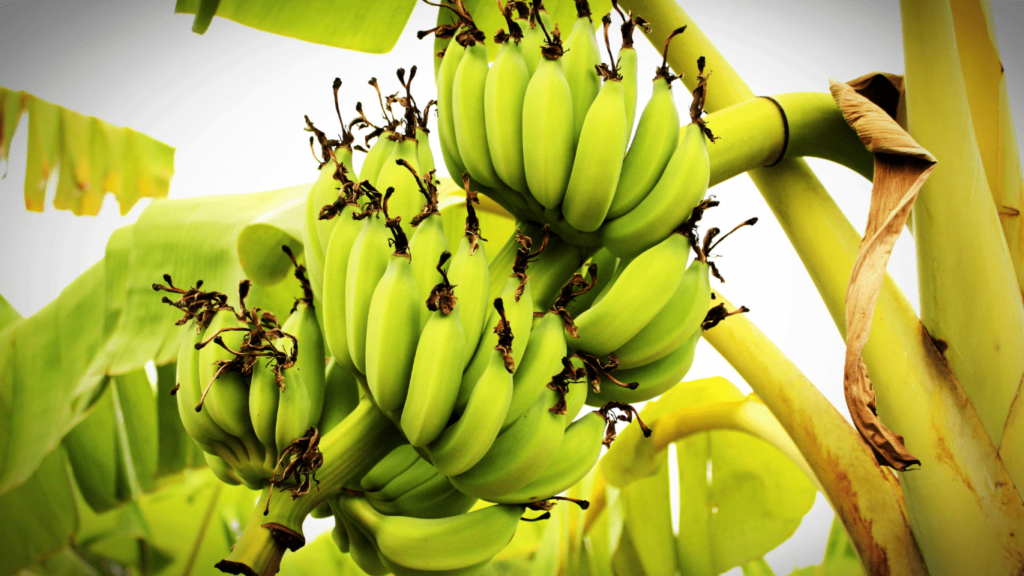
As long as they’re not eaten raw. Technically, unripe green bananas are safe for dogs, but only in small amounts and should always be cooked.
Green bananas are very starchy and difficult to digest, which can cause digestive problems for your dog. Ripe bananas have a sweeter taste, which your dog may prefer.
However, you should never add salt or sugar to enhance the flavor when feeding your dog bananas, as both are unhealthy for dogs.
In general, it’s best to wait until the fruit turns yellow or almost completely black, as this is when it’s ripe and ready to eat.
Can dogs eat bananas? Yes, but use ripe yellow bananas instead of green bananas.
Can Dogs Eat Banana Chips?
It all depends on how you cook them and what you add to them.
If you buy (or make your own) regular potato chips that are baked rather than fried, your pup can enjoy them in moderation.
Also, if you buy them from a store, check that the chips are plain and not coated with seasoning. While dogs need salt, too much salt in their diet can cause dehydration and sodium ion poisoning, which can be fatal (especially if the affected animal does not have access to clean water).
Potato chips coated with flavorings, such as onion powder or garlic, are a no-no. Garlic and onions are toxic to dogs and will make them sick.
So your furry friend can comfortably eat a few banana chips as long as they are baked and eaten plain.
However, they are high in carbohydrates, so you should not feed your dog too many!
Can Dogs Eat Bananas? Yes, but if they are in the form of chips, they must be baked and unseasoned.
Can dogs eat sweet bananas?
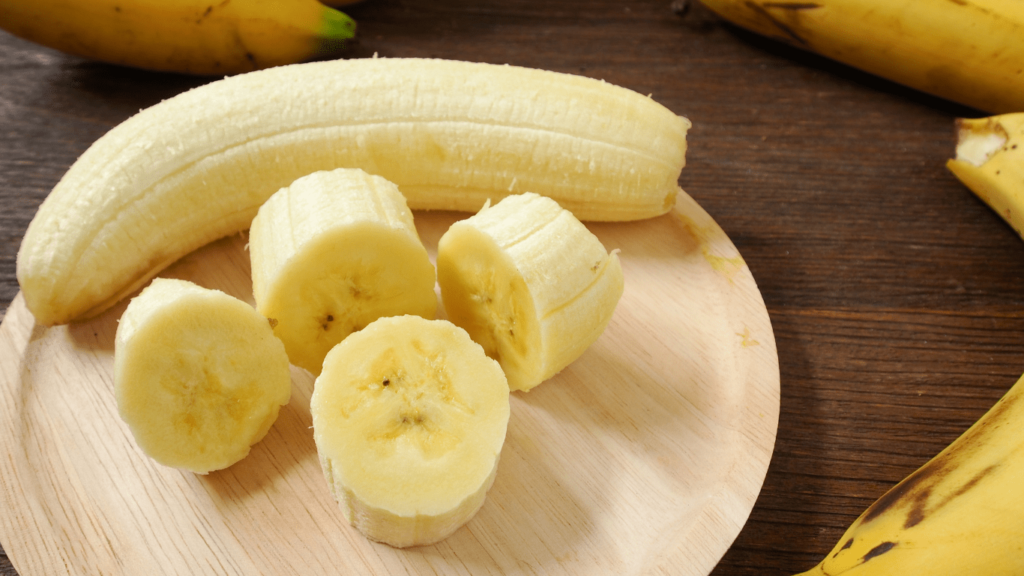
The riper the banana, the sweeter it tastes! Most dogs (and many people) prefer these bananas to unripe bananas, which are bitter and harder to chew.
Yellow bananas are quite sweet, but in general, the darker the banana, the sweeter it is. However, they are never as sweet as dessert bananas.
The same rules apply to sweet bananas as to any other banana:
• Avoid feeding your dog raw bananas.
• Don’t fry them.
• Don’t add seasonings.
• Don’t feed them in large quantities.
If you follow these guidelines, your dog should be fine.
Can dogs eat bananas? Yes, but it’s best to stick with sweet, ripe bananas.
Are plantains good for dogs?
Yes, in small amounts and when boiled or baked, bananas have many health benefits.
Let’s dissect a banana to see what’s inside:
• Vitamin C – an antioxidant that helps the immune system function properly.
• Vitamin A – great for healthy organs, keeping the immune system running smoothly and good vision.
• Dietary fiber – essential for gut health and helping to avoid constipation. It also helps the heart function properly by lowering cholesterol levels. Many good dog foods contain fiber, such as artichokes.
• Vitamin B6 – regulates proteins, fats and sugars to ensure they are used properly in the body. Also good for the brain, skin, nerves and other organs.
• Magnesium – supports muscle function, a healthy nervous system and energy production.
• Potassium – metabolizes carbohydrates, helps nerves and muscles function properly, synthesizes proteins and regulates heart rhythm.
• Protein – bananas provide a small amount of protein which is converted into amino acids, which help build and repair muscles and bones.
• Fat – bananas are low in fat, making them healthier than many other snacks.
• Carbohydrates – contrary to popular belief, not all carbohydrates are bad! Carbohydrates in processed foods contribute to weight gain, diabetes, obesity, heart disease, etc. But most of the carbohydrates in fruits and vegetables are insulated with fiber, so they are digested slowly. Because of this effect, they provide sustained energy over a longer period of time rather than a spike in energy that causes glucose and blood sugar levels to spike.
Additionally, bananas have antibacterial and anti-inflammatory properties that can help combat a number of health conditions and diseases.
As you can see, bananas are a great source of many essential nutrients, and your furry friend can benefit from them when fed in small amounts.
It’s always important to remember that just because a particular food is safe and healthy for us, it doesn’t necessarily mean it’s good for dogs! Dogs’ bodies process food differently, making some foods harmful and even potentially fatal.
Luckily, bananas are good for dogs, as long as you follow the advice.
Bottom Line: Can Dogs Eat Bananas?
Let’s wrap up by summarizing all the key points regarding the question: can dogs eat bananas?
Bananas are great for dogs and do not contain any toxins, but there are a few things to keep in mind:
• Only in small amounts. Bananas are high in starch, which dogs cannot digest easily. Domestic dogs have evolved to tolerate some starch in their diet, but most dog foods contain high amounts, so adding more can cause problems.
• Always cook bananas. Raw bananas are too hard for dogs to digest and will upset their stomachs. You can bake, steam, or boil bananas, but never give your dog fried bananas. You should also avoid using seasonings, especially salt, onion powder, garlic powder, or hot spices.
• Ripe bananas are best. They are sweeter and softer, and your furry friend will be able to enjoy them without any digestive issues. Wait until the fruit turns completely yellow or black.
If your dog has never eaten bananas before, it is best to be cautious. Always introduce new foods slowly to avoid any adverse effects.
Although bananas are a superfood, they should never replace your dog’s regular food.
Finally, contact your vet immediately if you have any concerns. We can only give general advice, and can never replace the extensive knowledge and expertise of a professional veterinarian.
So, with this newfound knowledge about bananas, you can safely feed your dog a slice or two at a time.
READ NEXT: Can Dogs Eat Pineapple? Benefits, Risks, and Expert Tips
